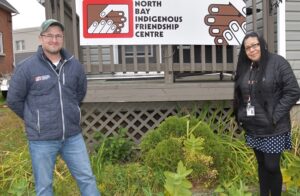Proportional funding essential for homeless Indigenous people in North Bay

By Kelly Anne Smith
NORTH BAY— Services for people who are homeless are needed now more than ever. And this is why Suswin Housing Navigator Workers are important and very much needed in the community.
A final report for the Ontario Trillium Foundation called Finding Home with Suswin lays out the dire situation. Indigenous Peoples make up about 14% of the population in the Nipissing District but 44% of the homeless population are Indigenous.
The North Bay and Nipissing area received almost $1.2 million over five years under the new federal homelessness strategy, called Reaching Home. Of this, the North Bay Indigenous Friendship Centre received $32,500 towards salaries of the Suswin Housing Navigator Workers.
In just three years of the program, Suswin of the North Bay Indigenous Friendship Centre, has helped hundreds of people access culturally-safe services and almost 200 people to secure housing. They also offer cultural events and training to other service providers to build relationships and collaborate for wrap-around trauma-informed support.
Heaps of praise have been given to the service the Suswin Housing Navigator Workers provide but secure funding to sustain them is needed by the spring.
“You can see in the Report that these two positions are needed. We are trying to obtain permanent funding in order to keep these workers going,” says Kathy Fortin, the North Bay Indigenous Friendship Centre’s Executive Director.
A tent city at city hall recently had Fortin sending two Suswin Housing Navigator Workers to see if there was any help needed.
“I sent them over there to check what was actually going on. They offered them snacks and socks. Some of them are looking for permanent affordable housing which is not available in North Bay.”
North Bay councillor Mark King chairs DNSSAB – the District of Nipissing Social Services Administration Board. He witnessed the offer of sustenance from Suswin Housing Navigator Workers during the tent city protest at city hall.
“I was on the site at that particular moment when Boots on the Ground did arrive. They provided a food pouch. I was quite surprised to see that and it was distributed amongst the people that were camped on city hall property,” he said. “It was obvious to me; the main individual was probably suffering from fatigue and I don’t think they had a proper meal in some time. I gather they (Suswin Housing Navigator Workers) provided the food pouches. That was good to have happened for sure.”
Suswin Housing Navigator Workers have been donating care packages to Boots on the Ground who are also reaching out to the homeless.
Jeff LeBrun of the grassroots group Boots on the Ground has been reaching out to those in need for two years. He says the North Bay Indigenous Friendship Centre helps him reach every single member of the community.
“If they are in the bush or if they are in the allies.”
LeBrun is appreciative of the North Bay Indigenous Friendship Centre Suswin Homeless Navigators.
“They’ve helped us supply our care packages – that little bit of extra food that we give out. That also helps us mend that bridge to be able to speak to them. You want to build up a rapport. In order to do that, you have to show that you are genuinely concerned for their safety. We go out and deliver care packages at night time. A lot of individuals don’t always use the services that are available. We’ll go out there and provide blankets,” LeBrun says. “The Indigenous Friendship Centre has put us leaps and bounds ahead. Especially as of late. They have given supplies to help out everyone on the street. It makes a big difference.”
North Bay’s Gathering Place offers meals to those that are hungry. The Executive Director Dennis Chippa praises Suswin.
“The Suswin Housing Navigators play a crucial role in working within the homeless community. Their outreach team was a regular part of our Warming Centre pre-COVID.”
Fortin says the Suswin Village is desperately needed; 30 units of supportive housing for homeless and transient Indigenous community members will be built across from the North Bay Indigenous Friendship Centre starting spring 2021.
“A lot of these people don’t want to be on a cot on a gym floor. It brings back memories of residential school. Having this transitional housing is important so they have a space of their own, behind a door in their own room. It’s really needed, especially for Indigenous people because of their past trauma.”
“A lot of cultural teachings and learnings need to take place within the agencies. As an Indigenous organization, we really reach out and go out there and help our people.”
Fortin points out that the coronavirus disease 2019 (COVID-19) pandemic is a challenge for those seeking services.
“Usually our doors are open. Sometimes our workers can identify their issues by them coming in the building. But we have to go out into the city and some of them are hidden in the bushes. Our workers do know where a lot of the tent cities are located,” says Fortin. “Right now, we actually have a tent set-up across the street where we are going to build our transitional housing. The day we announced we had received the funding, we got phone calls from people wanting to be put on a waiting list.”
“I did have a meeting with the minister of Municipal Affairs and Housing and said this has to happen.”

